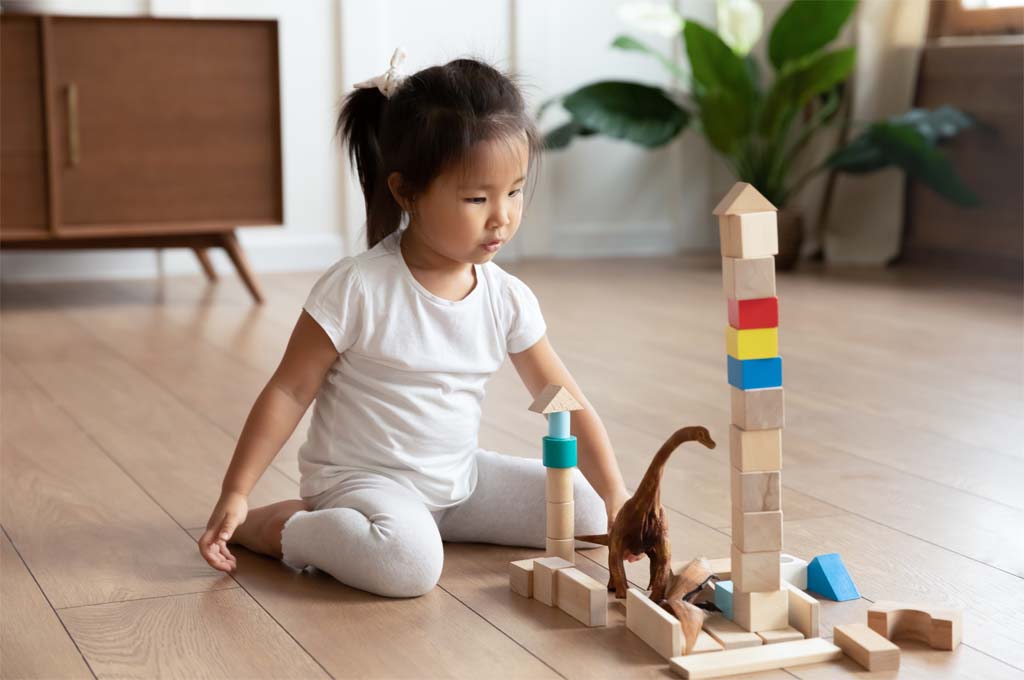Parents often dismiss play time for children as a sort of break from learning. Perhaps this is because we associate our own breaks from our jobs or responsibilities as our “play time”—we head to the beach, enjoy a round of golf, or go off on a hike for a little “me” time.
But, for children learning and play are inextricably intertwined. Play is an important part of learning—it is the vehicle by which children learn to make sense of their environment and their role in it.
Famed Swiss psychiatrist Carl Jung once said:
“The creation of something new is not accomplished by the intellect but by the play instinct.”
It is important to understand that it is through play your child will develop physical strengths, emotional maturity, and lay the groundwork for academic success in the future.
What is Play Based Learning
Play based learning is a teaching method for young learners that involves child-led play. The students determine the course of the teaching with teacher support and the goal is open ended.
Play based learning allows instructors to teach based on a child’s own interests. For example, if a student is playing in the imaginative play area of the classroom, the teacher can guide the student through role playing common scenarios. (If I am the grocer, how would I ring up your groceries? I’m sorry, the store is out of milk…what can we do to solve this problem?)
Similarly, if a student is playing with a set of blocks the teacher can guide them through math awareness (How many blocks are in this pile? What if I take two blocks away…how many are left?), science awareness (What causes the block tower to fall?), and problem solving (How can we make the base more stable so we can build a taller tower?).
Play provides children first-hand experience in a variety of tasks and situations, and helps them develop emotionally, socially, and academically.
Advantages of Play Based Learning
Improved Communication
Play based learning helps children learn to communicate better by watching interactions with their peers. Interacting with other children helps young learners perfect their communication by improving their speech and expanding their vocabularies.
Again, teachers play a vital role in this area of development. For example, when a student asks a question using an incomplete sentence, the teacher may repeat the sentence using proper grammar, then answer the question. This method offers subtle correction without drawing attention to the fact the student used improper grammar.
Improved Social Skills
Preschool offers a safe environment in which children can expand their imaginations and learn about the real world around them. They can practice problem solving and learn to draw boundaries about what is good and bad, right and wrong, safe and dangerous.
Through independent play children learn how to enjoy their own company. When engaging in associative play, children learn important concepts like sharing, taking turns, and settling disagreements appropriately.
Creativity Boost
Play based learning allows children to develop some control over their environment using their imaginations. Through imaginative play, children can safely explore a variety of scenarios and control their experience by making independent decisions and choices.
Play allows children to develop a deeper understanding of who they are as an individual and how they want the rest of the world to see them. Creativity and social development thrive in a play-based learning environment.
Critical Thinking
Parents are often surprised to learn that play provides regular opportunities for children to practice their problem-solving skills. Learning to take a big problem and break it down into smaller parts is something teachers will model for students (The block tower keeps falling over? What happens if you build it on tile rather than carpet? What happens if you use blocks of similar size for the tower base?)
Comparing similarities and differences and learning to sort are a few critical thinking skills that students hone during play-based learning.
Motor Skills
Preschool is the perfect place for children to develop both fine (small muscle) and gross (large muscle) motor skills—and play is a natural place for development to occur. (If you missed our blog about fine motor skill development, you may read it by clicking here.)
When playing with blocks, completing puzzles, drawing, painting, or sliding pasta onto a string, students are improving their fine motor skills.
Running, jumping, climbing, dancing, and skipping all work the large muscles of the torso and extremities, improving gross motor skills.
If you are a regular follower of our blog, you know how much we love this quote from the beloved Fred Rogers:
Play gives children a chance to practice what they are learning.
The importance of play in the learning of a child cannot be overstated.
It is important.
It is vital.
And it sets the foundation on which all future learning will take place.
Here’s to adopting a new perspective on the importance of play!
For any more information, call Clovel Childcare and Early Learning Centre, don’t hesitate to get in touch with us. For any information about our Educational Programs, give us a call at 02 9199 0294 or fill in this contact us form.
Thanks for reading,
Clovel Childcare
1300 863 986
Additional References:











